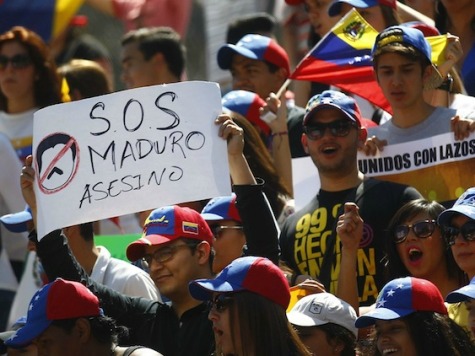
With months of civil unrest, 42 dead, and a consistent effort by Senator Marco Rubio for the United States to stand up for human rights, the Senate Foreign Relations Committee has passed a bill urging the United States to sanction high-level officials in the Venezuelan government for human rights abuses occurring in the country.
The sanctions requested, the Wall Street Journal explains, would be similar to those imposed on Russian officials: specifically targeted towards individuals in the Venezuelan government responsible for the oppression of peaceful protesters. These sanctions would be narrowly tailored towards those “directing significant acts of violence or serious human rights abuses against persons associated with the anti-government protests in Venezuela.” It would also allot $15 million to NGOs working to promote human rights in the region.
The Senate Foreign Relations Committee passing the bill follows a similar measure by the House of Representatives, where representatives have voted to send the bill to the House floor.
The sanctions would prevent these individuals from coming to the United States by denying them visas and blocking financial assets, which would prevent them from spending money in the country. Investigative reports on both government officials and allies of the Chavista government have uncovered excessive spending in the United States on mansions, yachts, and luxury items–all while decrying American capitalism as immoral consumerism and imposing a rationing system for essential goods such as milk, vegetable oil, and flour.
The effort to sanction prominent Chavistas has been at the forefront of Senator Marco Rubio’s agenda for months. In March, he noted it was “shameful” the United States had yet to sanction these groups while officials in the government posted photos on social media of themselves and gold-plated iPhones, while dozens of Venezuelans were killed in the streets for opposing their socialist policies. Of this latest effort, Sen. Rubio noted to the Wall Street Journal that “the U.S. should always be on the side of human rights around the world,” and that he had prepared a list of more than twenty officials in the Venezuelan government to be sanctioned. These sanctions, he noted, were against enemies of the Venezuelan people, not Venezuela itself.
While the United States Department of State has been hesitant to agree to impose sanctions, concerned that the Maduro administration would use sanctions to turn people against the United States, President Nicolás Maduro himself has already begun attacking Assistant Secretary of State Roberta Jacobson. While Jacobson has said that moderate opposition members in Venezuela had asked the United States not to impose sanctions, Maduro nonetheless sounded off on her.
“What can be said of the threat of sanctions from the Senate Foreign Relations Committee of the United States, a detestable event because no one should meddle in our country,” he said yesterday during a televised cabinet meeting. “I repudiate, reject, detest the interference of these sectors of the American ultra-right wing in our internal affair… and the even more detestable remarks of Jacobson.”
Maduro has previously attacked Sen. Rubio as a “corrupt bandit politician” and “the craziest of the crazies.”
Other Chavistas have reacted with apathy toward the sanctions. Mayor Jorge Rodríguez of Libertador, Carabobo, said at a press conference that it “would be an honor” to be sanctioned and that he and other Chavistas “do not care very much about sanctions and opinions coming from the United States government.”

COMMENTS
Please let us know if you're having issues with commenting.